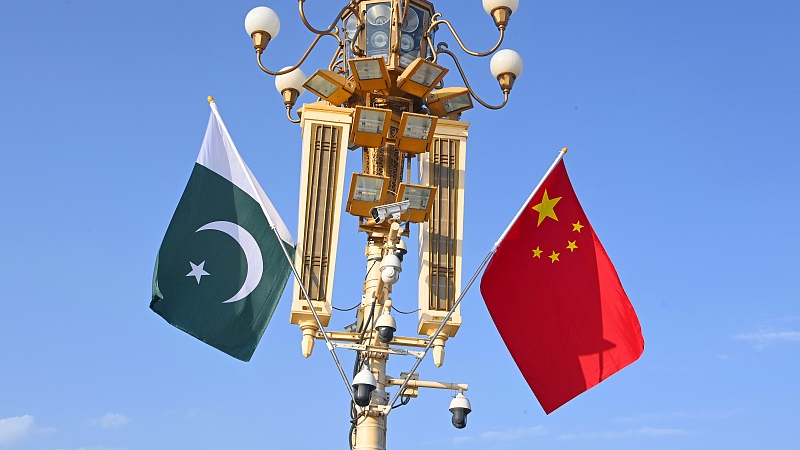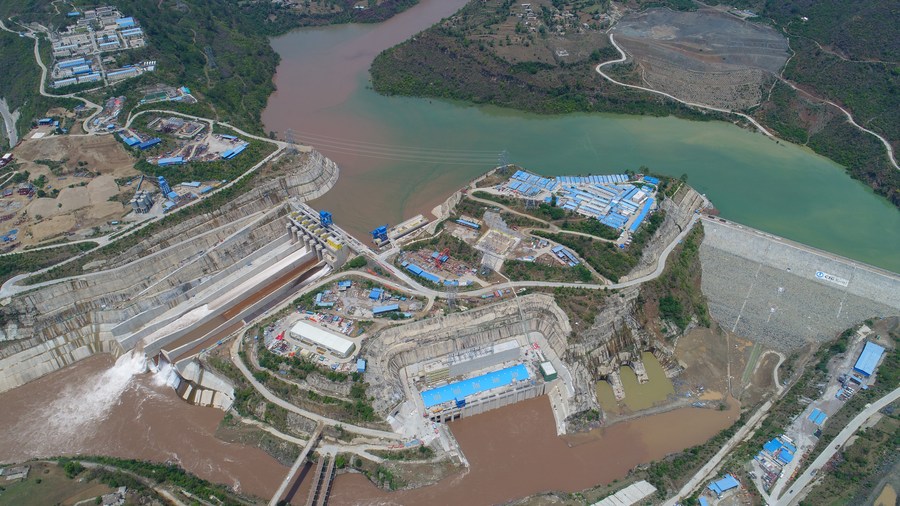
The national flags of China and Pakistan are seen in Tian'anmen Square in Beijing, capital of China, November 1, 2022. /CFP
The national flags of China and Pakistan are seen in Tian'anmen Square in Beijing, capital of China, November 1, 2022. /CFP
Editor's note: Hannan Hussain is a foreign affairs commentator and author. He is a Fulbright recipient at the University of Maryland, the U.S., and a former assistant researcher at Islamabad Policy Research Institute. The article reflects the author's opinions and not necessarily the views of CGTN.
Pakistani Prime Minister Shehbaz Sharif undertook an official two-day visit to China from November 1 to 2. The visit saw the consolidation of major strategic cooperation themes under the China-Pakistan all-weather partnership, reflected amply in their joint statement.
The declaration put the spotlight on robust all-round development under the Belt and Road Initiative (BRI), engagement of new trade sectors, and more enduring China-Pakistan commitments to regional security. "China-Pakistan friendship is a historic choice of both peoples that serves the interests of the two countries," stated both leaders in the statement. "Relations with Pakistan will always be given the highest priority in its (China's) foreign policy," affirmed Beijing.
Expect even stronger momentum to drive the China-Pakistan Economic Corridor's high quality development post Sharif's visit. Both sides have put their weight behind key takeaways from the 11th China-Pakistan Economic Corridor (CPEC) Joint Cooperation Committee, which plays a meaningful role in informing progress towards high-profile infrastructure, transport and free zone projects. Unwavering diplomatic support for the corridor reinforces its status as a catalyst for Pakistan's socioeconomic development, an enduring commitment from China to date.
That commitment is now accompanied by heightened prospects of accelerated engagement in information technology (IT), agriculture, health, industry, digital and green corridors. All this effectively indicates vast potential to align CPEC's growth with changing market needs. That flexibility is reinforced by China's and Pakistan's earlier consensus that the corridor is an "open and inclusive platform," a noble contrast to some of the more divisive development arrangements in the international space.
CPEC's connectivity promise is illustrated by broad-based convergence around trade liberalization measures, the China-Pakistan Free Trade Agreement, and more export-oriented market contributions to boost China-Pakistan connectivity to the region's benefit. As CPEC derives advantage from high-level diplomatic support and quality development committees, both leaderships are on track to scale the benefits of economic integration in their neighborhood. As the joint statement indicates, "CPEC's extension to Afghanistan" is a fitting illustration of that very resolve.

A view of Karot Hydropower Plant, the first hydropower investment project under the China-Pakistan Economic Corridor, in Pakistan, June 22, 2022. /Xinhua
A view of Karot Hydropower Plant, the first hydropower investment project under the China-Pakistan Economic Corridor, in Pakistan, June 22, 2022. /Xinhua
Wednesday's joint statement should also be remembered for the exemplary counterterrorism cooperation between Islamabad and Beijing. It shows in the prioritization of closer defense coordination going forward, as well as a sustained and strong "determination to counter all threats and designs against CPEC and China-Pakistan friendship." Moreover, the utmost stability of the BRI's flagship project resonates as a chief priority in both capitals.
It is here that Sharif's visit takes a welcome leap forward. It has amplified a message of unity to the outside world that Beijing and Islamabad stand firmly opposed to the "politicization of the issue of counter terrorism." Such a principled stand is characteristic of the all-weather strategic partnership between the two countries for years, and is essential for other competing powers to rise beyond political overtones and address pressing security challenges in South Asia.
Interestingly, there is also a wealth of historic cooperation between China and Pakistan that establishes their reaffirmed commitment to "international peace and security." By jointly calling a "peaceful and prosperous South Asia" as the "common interest of all parties," Beijing and Islamabad continue to underscore the significance of multilateral peace building in areas that matter, including conflict-hit Afghanistan.
Finally, Sharif's visit paved the way for a welcome China-Pakistan consensus on expanding development cooperation under the Global Development Initiative (GDI) framework "for realization of Sustainable Development Goals." Synchronizing future development strategies on common goals, such as poverty reduction, strikes the right chord with the people of Pakistan. Particularly as they brave the tides of unprecedented flood damage, a key point of support for the Chinese side.
On the back of such symbolism, the China-Pakistan all-weather friendship stands to gain even more ground on win-win development. China has identified Pakistan as "a priority partner" under GDI, and the latter maintains its status as one of the pioneering members of the Group of Friends of GDI.
Taken together, Sharif's visit to China should be seen as another unmitigated success for the China-Pakistan "all-weather" strategic cooperative partnership. It opens the doors to even greater diversification of economic, development and security cooperation, with tangible benefits for a world in waiting.
(If you want to contribute and have specific expertise, please contact us at opinions@cgtn.com. Follow @thouse_opinions on Twitter to discover the latest commentaries in the CGTN Opinion Section.)